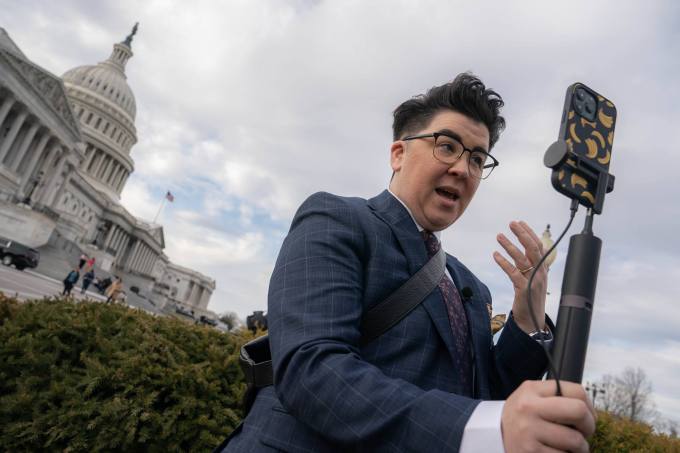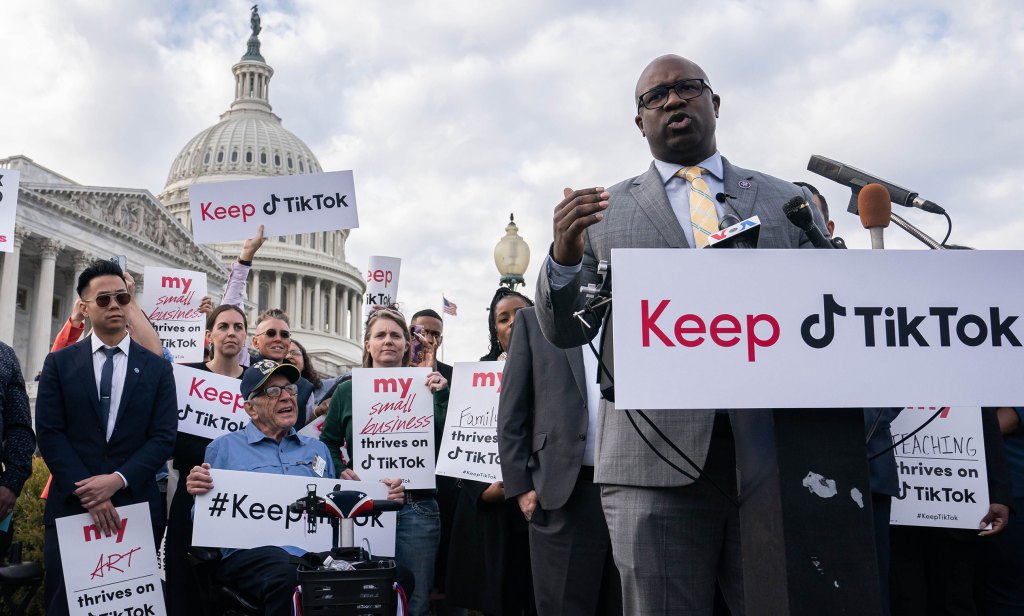In the aftermath of TikTok CEO Shou Zi Chew’s brutal five-hour Congressional hearing on Thursday, TikToker and disinformation researcher Abbie Richards summed up what so many creators were thinking: “It’s actually remarkable how much less Congress knows about social media than the average person,” Richards told TechCrunch.
Across TikTok, users mocked congresspeople for misunderstanding how technology works. In one instance, Representative Richard Hudson (R-NC) asked Chew if TikTok connects to a user’s home Wi-Fi network. Chew responded, bewildered, “Only if the user turns on the Wi-Fi.”
The ignorant questions weren’t unique to the government’s interrogation of Chew. At a high-profile hearing in 2018, the late Senator Orrin Hatch (R-UT) infamously asked Meta CEO Mark Zuckerberg how Facebook makes money if the app is free. Zuckerberg responded, “Senator, we run ads,” failing to stifle a smirk. During a tech hearing two years ago, Senator Richard Blumenthal (D-CT) created another notorious viral moment by asking Facebook’s global head of safety if she would “commit to ending finsta.”
As entertaining as these lapses in basic knowledge are, TikTok creators have serious concerns about the future of an app that’s given them a community and, in some cases, a career.
TikTok creator Vitus “V” Spehar, known as Under the Desk News, has amassed 2.9 million followers by sharing global news in an approachable way. But in this week’s news cycle, they’re front-and-center (literally: they sat right behind the TikTok CEO as he testified).
“I think it’s really concerning that a government is considering removing American citizens from the global conversation on an app as robust as TikTok,” Spehar told TechCrunch. “It’s not just banning the app in the United States; it means disconnecting American citizens from Canada, the UK, Mexico, Iran, Ukraine and all of the frontline reporting you see from those countries. It just shows up on our [For You page].”
Spehar is part of a group of TikTok creators who travelled to Washington, D.C. this week to advocate on TikTok’s behalf — and against the looming threat of a national ban. They participated in a press conference on Wednesday afternoon hosted by Representative Jamaal Bowman (D-NY), a rare dissenting voice in Congress who raised questions about what he described as the “hysteria and panic” surrounding TikTok.

“Congress made clear that they don’t understand TikTok, they don’t listen to their constituents who are in the community of TikTokers — and are using this TikTok hysteria as a way to pass legislation that gives them superpowers to ban any app they deem ‘unsafe’ in the future,” Spehar said following the hearing.
Tech ethicists and creators alike share this frustration. Dr. Casey Fiesler, a University of Colorado Boulder professor of tech ethics and policy, believes that the national security concerns about the app are overstated.
“The risk seems to be entirely speculative right now, and to me, I’m not sure how it is substantially worse than all of the things that are troubling about social media right now that the government has not been focusing on,” Fiesler said. She commands an audience of over 100,000 followers on TikTok, where she explores issues like the nuances of content moderation and other topics that might come up in her graduate courses.
“I don’t think there’s any way to frame this as a general data privacy issue without going after every other tech company,” Fiesler told TechCrunch. “The only thing that makes sense is that it’s literally only about the fact that the company is based in China.”
There is still no evidence that TikTok has shared data with the Chinese government. But reports have shown that employees at TikTok’s Beijing-based parent company ByteDance have viewed American user data. An investigation last year revealed that engineers in China had open access to TikTok data on U.S. users, undermining the company’s claims to the contrary. Another report, corroborated by ByteDance, found that a small group of engineers inappropriately accessed two U.S. journalists’ TikTok data. They planned to use the location information to determine if the reporters had crossed paths with any ByteDance employees who may have leaked information to the press.
Still, TikTokers point to the distinction between sharing data with a private Chinese company and the Chinese government. For its part, TikTok has tried to appease U.S. officials with a plan called Project Texas, a $1.5 billion undertaking that will move U.S. users’ data to Oracle servers. Project Texas would also create a subsidiary of the company called the TikTok U.S. Data Security Inc., which plans to oversee any aspect of TikTok involving national security.
@professorcasey TikTok hearing thoughts. It went exactly as expected. #tiktokhearing #tiktokban #dontbantiktok #dataprivacy #contentmoderation
Spehar said that they favor solutions like Project Texas over U.S. government proposals like the RESTRICT Act, which would give the U.S. new tools for restricting and potentially banning technology exports from foreign adversaries.
“I don’t think we should be looking at things like the RESTRICT Act, or any kind of broad legislation that gives the government the power to say, ‘We’ve decided something is unsafe,’” they told TechCrunch.
Multiple congresspeople asked Chew about how TikTok moderates dangerous trends like “the blackout challenge,” in which children tried to see how long they can hold their breath. Children died from this behavior after it circulated on TikTok, but the game didn’t originate on the platform: As early as 2008, the CDC warned parents that 82 children had died from a trend called “the choking game.” One congressman even referenced “NyQuil chicken” as a dangerous TikTok trend, despite the fact that there is little evidence anyone actually ate chicken soaked in cough medicine and the trend originated years ago on 4chan.
“The moral panic over TikTok challenges is something I’ve debunked extensively, and then they just get parroted by these politicians that don’t understand what a moral panic is,” Richards told TechCrunch. “To utilize misinformation that I’ve written about so much and tried to debunk, and to see it used against TikTok was just so infuriating.”
Richards does acknowledge that TikTok’s best feature is also its worst: Anything can go viral. She believes TikTok’s “bottom-up” information environment does lend itself to misinformation, but that same dynamic also surfaces good content that would never get exposure on a different social network.
Richards is also a vocal critic of TikTok’s content moderation policies, which, like every other social network, are not always applied evenly. During Thursday’s hearing, Rep. Kat Cammack (R-FL) dramatically screened a month-old TikTok video depicting a gun alongside text threatening the leader of the House Committee that orchestrated Chew’s testimony. It’s an obvious violation of TikTok’s content guidelines, but Richards points out that it had very little engagement.
“In the context of TikTok, something having 40 likes is effective moderation,” Richards said. “That means the video isn’t reaching very many people.” She believes that a video like the one the Florida lawmaker highlighted shouldn’t be on the platform at all, but ultimately, if it doesn’t reach many users then the potential for harm is limited.
Other creators expressed frustration that congresspeople failed to consider how TikTok has helped Americans, like LGBTQ+ people who found community on the app or small business owners who were able to grow beyond their wildest dreams after going viral.
Trans Latina creator Naomi Hearts, who has 1 million TikTok followers, was invited by TikTok to support the app in D.C. (TikTok compensated this group of creators, which included Spehar, by covering lodging and travel costs). She said that she met other TikTokers on the trip who had used the app to gain traction for their small businesses.
She also found an audience on TikTok that she wasn’t able to build elsewhere after struggling to grow a following on Instagram. But on TikTok, even small accounts have the potential to go viral, a phenomenon that can jumpstart a career when things work out.
“The message of the normal person… for example, me, who was just a plus-sized trans woman who grew up in South Central Los Angeles and had a dream — my message was not there,” Naomi Hearts said, referring to Instagram.
Spehar also emphasized the role that TikTok plays in helping people connect well outside the bounds of their everyday surroundings.
“You can find communities that you can’t where you live,” Spehar said. “I think about kids in Northwest Arkansas and in Tennessee — TikTok is literally one of the reasons they’re not taking their lives, because they know they’re not alone.”
Although Richards mostly writes about disinformation on TikTok, she laments the positive sides of the app that could be lost if it gets banned in the U.S.
“Banning TikTok would ultimately harm marginalized communities the most, who are least represented by institutional news and organizations,” Richards said. “And if, all of a sudden, that entire infrastructure disappears, they will just suddenly be in the dark.”































Comment